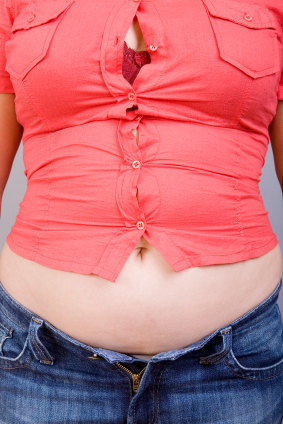How Your Hormones Are Keeping You Fat
by Kevin DiDonato, MS, CES
She went to work…
She ate clean…exercised daily…and started to see some results on the scale.
As she got closer to her goal weight, we both started to notice something:
It was getting harder and harder for her to fight the cravings and continue to lose the remaining FIVE pounds.
She started to get frustrated…she started to get angry…she even got a little depressed.
No matter what she did, she couldn’t manage to keep the weight off.
Does this sound familiar?
Turns out, according to a new research study, her very OWN body was putting up a defense and trying to keep her at a certain weight!
I know it sounds crazy, but it’s true! So, if you’ve been struggling to lose weight—and keep it off—then you could be in the same situation.
Take a look…
Hunger Hormones and Weight Loss
Your fat cells are pretty amazing. Not only are they able to take on excess energy and store it for later use, but they are also able to produce metabolism-boosting hormones as well.
But that’s not all they produce. They also produce a hormone called Leptin, which is considered one of the “hunger hormones,” and decreases your appetite.
Now, besides Leptin, there is another hormone that your body produces that keeps you hungry. And that is Ghrelin.
Ghrelin acts in the opposite of Leptin, stimulating your appetite and making you hungry all the time. It also plays a role in maintaining body weight.
So, how does Ghrelin impact your weight loss? Well, when you are overweight—even by five to ten pounds—your body starts to produce MORE Leptin in order to try to slow down the weight gain.
Well, when you are overweight—even by five to ten pounds—your body starts to produce MORE Leptin in order to try to slow down the weight gain.
However, your body doesn’t really listen to the increase signal—called Leptin resistance—so you continue to eat more.
When you start to lose, though, your Leptin levels start to drop…
…but your Ghrelin levels may start to climb! And this could make you feel hungry—all the time!
And that’s exactly what the researchers found!
They noticed that when people started to lose weight, their Ghrelin levels spiked by a whopping 23 percent!
Naturally, this would lead to hunger spikes and could easily railroad your diet, since you always have the need to feed yourself.
You can thank your body for its natural instincts and trying to keep you at a weight it thinks is normal!
And all those extra calories could end up causing more weight gain!
But there is good news: As the subjects continued on their weight loss journey, their Ghrelin levels started to DROP!
In fact, after just one year of maintaining their weight loss program, the subjects' Ghrelin levels DROPPED to just SEVEN percent!
Talk about making it easier to control your appetite! And, according to other research, as your weight levels drop, your Leptin levels start to drop as well!
The combination of both Leptin and Ghrelin decreasing could make it easier for you to lose—or maintain—your weight loss!
Plus, as you lose weight, you may have an increase in two important hormones—GLP-1 and PYY3-36.
These two hormones may actually boost your satisfaction and feeling of fullness after a meal. According to the study, as the year went on, these two hormones started to climb!
This is important as they boost your feelings of satisfaction after a meal and could keep you from eating more!
Take Home Message
There are a lot of factors that play into your ability to lose or maintain your weight loss.
But one factor, the production of “hunger hormones,” could play a much more important role in your ability to lose or maintain your weight.
According to new research, the hormone Ghrelin (appetite stimulator), could increase in the first few weeks to months after you start to lose weight.
But, Ghrelin production may level off—even DROP—after a year of weight loss or weight maintenance.
And you may have an increase in two potent hormones that keep you feeling full after a meal!
So, if you’ve been struggling to lose weight—and you’re frustrated by it—you could be experiencing changes in the hormone levels that impact your appetite.
But, if you stick to your program—keep eating right and exercising—then you may be able to lower the production of those hormones, which could keep your weight loss on track!
I had a client who wanted to lose 20 pounds.
We adjusted her eating…we made changes to her exercise program...all in the hopes that she would lose that last 20 pounds she needed.
We adjusted her eating…we made changes to her exercise program...all in the hopes that she would lose that last 20 pounds she needed.
She went to work…
She ate clean…exercised daily…and started to see some results on the scale.
As she got closer to her goal weight, we both started to notice something:
It was getting harder and harder for her to fight the cravings and continue to lose the remaining FIVE pounds.
She started to get frustrated…she started to get angry…she even got a little depressed.
No matter what she did, she couldn’t manage to keep the weight off.
Does this sound familiar?
Turns out, according to a new research study, her very OWN body was putting up a defense and trying to keep her at a certain weight!

I know it sounds crazy, but it’s true! So, if you’ve been struggling to lose weight—and keep it off—then you could be in the same situation.
Take a look…
Hunger Hormones and Weight Loss
Your fat cells are pretty amazing. Not only are they able to take on excess energy and store it for later use, but they are also able to produce metabolism-boosting hormones as well.
But that’s not all they produce. They also produce a hormone called Leptin, which is considered one of the “hunger hormones,” and decreases your appetite.
Now, besides Leptin, there is another hormone that your body produces that keeps you hungry. And that is Ghrelin.
Ghrelin acts in the opposite of Leptin, stimulating your appetite and making you hungry all the time. It also plays a role in maintaining body weight.
So, how does Ghrelin impact your weight loss?
 Well, when you are overweight—even by five to ten pounds—your body starts to produce MORE Leptin in order to try to slow down the weight gain.
Well, when you are overweight—even by five to ten pounds—your body starts to produce MORE Leptin in order to try to slow down the weight gain.However, your body doesn’t really listen to the increase signal—called Leptin resistance—so you continue to eat more.
When you start to lose, though, your Leptin levels start to drop…
…but your Ghrelin levels may start to climb! And this could make you feel hungry—all the time!
And that’s exactly what the researchers found!
They noticed that when people started to lose weight, their Ghrelin levels spiked by a whopping 23 percent!
Naturally, this would lead to hunger spikes and could easily railroad your diet, since you always have the need to feed yourself.
You can thank your body for its natural instincts and trying to keep you at a weight it thinks is normal!
And all those extra calories could end up causing more weight gain!
But there is good news: As the subjects continued on their weight loss journey, their Ghrelin levels started to DROP!
In fact, after just one year of maintaining their weight loss program, the subjects' Ghrelin levels DROPPED to just SEVEN percent!

Talk about making it easier to control your appetite! And, according to other research, as your weight levels drop, your Leptin levels start to drop as well!
The combination of both Leptin and Ghrelin decreasing could make it easier for you to lose—or maintain—your weight loss!
Plus, as you lose weight, you may have an increase in two important hormones—GLP-1 and PYY3-36.
These two hormones may actually boost your satisfaction and feeling of fullness after a meal. According to the study, as the year went on, these two hormones started to climb!
This is important as they boost your feelings of satisfaction after a meal and could keep you from eating more!
Take Home Message
There are a lot of factors that play into your ability to lose or maintain your weight loss.
But one factor, the production of “hunger hormones,” could play a much more important role in your ability to lose or maintain your weight.
According to new research, the hormone Ghrelin (appetite stimulator), could increase in the first few weeks to months after you start to lose weight.
But, Ghrelin production may level off—even DROP—after a year of weight loss or weight maintenance.
And you may have an increase in two potent hormones that keep you feeling full after a meal!
So, if you’ve been struggling to lose weight—and you’re frustrated by it—you could be experiencing changes in the hormone levels that impact your appetite.
But, if you stick to your program—keep eating right and exercising—then you may be able to lower the production of those hormones, which could keep your weight loss on track!






